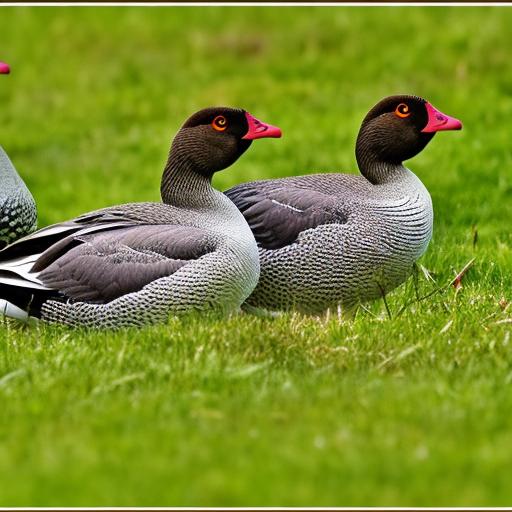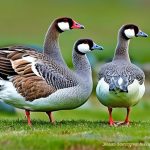Geese infestation is a common problem that many people face, especially those who live near bodies of water or open fields. These birds can cause damage to property, create unsightly messes, and even pose health risks. While it may be tempting to resort to drastic measures to get rid of geese, it is important to approach the issue with compassion and find humane solutions.
Key Takeaways
- Geese are social animals and tend to congregate in areas with water and food sources.
- Physical barriers such as fences and netting can prevent geese from accessing certain areas.
- Repellents such as taste aversions and visual deterrents can discourage geese from staying in an area.
- Creating an unattractive environment by removing food sources and reducing water access can make an area less appealing to geese.
- Decoys and sound deterrents can be effective in tricking geese into thinking an area is unsafe or already occupied.
Understanding the behavior of geese
To effectively control geese infestation, it is crucial to understand their behavior patterns. Geese are social animals that live in flocks and are highly adaptable. They are attracted to areas with ample food sources, open spaces for nesting, and bodies of water for swimming and protection. Geese infestations often occur in areas where these conditions are present.
Implementing physical barriers
One effective method of geese control is the use of physical barriers. These barriers can prevent geese from accessing certain areas, such as lawns or ponds. There are various types of physical barriers available, including fences, netting, and floating islands. Fences can be installed around the perimeter of a property or specific areas to keep geese out. Netting can be used to cover ponds or other bodies of water to prevent geese from swimming in them. Floating islands can be placed in ponds to provide an alternative nesting site for geese.
Using repellents to deter geese
Another approach to geese control is the use of repellents. There are different types of repellents available, including visual repellents, auditory repellents, and taste repellents. Visual repellents include scarecrows, reflective tape, and predator decoys. Auditory repellents emit sounds that are unpleasant to geese, such as distress calls or predator noises. Taste repellents can be applied to grass or other surfaces to make them unappealing for geese to feed on.
Creating an unattractive environment for geese
Creating an unattractive environment for geese is another effective way to deter them from your property. This can be done by removing or reducing food sources, such as grass clippings or fallen fruits. It is also important to keep the area clean and tidy, as geese are attracted to areas with ample water and open spaces for nesting. Regularly mowing the lawn, removing weeds, and cleaning up debris can help make your property less appealing to geese.
Installing decoys to trick geese

Installing decoys is a clever way to trick geese into thinking that an area is already occupied. There are different types of decoys available, including predator decoys and swan decoys. Predator decoys, such as fake coyotes or foxes, can scare geese away by mimicking their natural predators. Swan decoys can also be effective, as geese tend to avoid areas where swans are present.
Using sound deterrents to scare geese away
Sound deterrents can be an effective method of scaring geese away from your property. There are various types of sound deterrents available, including sonic devices and ultrasonic devices. Sonic devices emit loud noises or distress calls that are unpleasant to geese. Ultrasonic devices emit high-frequency sounds that are inaudible to humans but can be heard by geese.
Maintaining a clean and tidy lawn
Maintaining a clean and tidy lawn is essential for geese control. Geese are attracted to areas with ample food sources, so it is important to remove any fallen fruits or other food debris from the lawn. Regularly mowing the grass and removing weeds can also help make your lawn less attractive to geese.
Seeking professional help for geese control
If you are unable to effectively control the geese infestation on your own, it may be necessary to seek professional help. Professional geese control services have the knowledge and experience to handle geese infestations effectively and humanely. When choosing a professional service, it is important to consider their methods and ensure that they prioritize the well-being of the geese.
Educating your community on geese management
Educating your community on geese management is crucial for long-term success in controlling geese infestations. By raising awareness about the importance of humane approaches and providing information on effective methods, you can encourage others to take action and contribute to the overall management of geese in your area.
Being humane in your approach to geese control
It is important to approach geese control with compassion and prioritize the well-being of the geese. While it may be frustrating to deal with the mess and damage caused by geese, it is essential to remember that they are living creatures that deserve respect. By implementing humane methods and seeking professional help when needed, you can effectively control geese infestations without causing harm.
Geese infestation can be a challenging problem to deal with, but it is important to approach it with compassion and find humane solutions. By understanding the behavior of geese, implementing physical barriers, using repellents, creating an unattractive environment, installing decoys, using sound deterrents, maintaining a clean lawn, seeking professional help when needed, educating your community, and being humane in your approach, you can effectively control geese infestations while prioritizing the well-being of the geese.
If you’re looking for more information on geese and how to keep them off your lawn, you might also be interested in learning about the incubation period for goose eggs. Understanding this process can help you better understand the behavior and habits of geese, which in turn can aid in finding effective solutions to deter them from your property. Check out this informative article on what is the incubation period for goose eggs to gain valuable insights into the world of geese and how to manage their presence.
FAQs
What are some effective ways to keep geese off your lawn?
There are several effective ways to keep geese off your lawn, including using decoys, installing fencing, using repellents, and modifying the landscape.
What are some natural repellents that can be used to keep geese away?
Some natural repellents that can be used to keep geese away include planting certain types of vegetation, using noise deterrents, and using visual deterrents such as reflective tape or balloons.
What are some common mistakes people make when trying to keep geese off their lawn?
Some common mistakes people make when trying to keep geese off their lawn include using ineffective or outdated methods, not being consistent with their efforts, and not addressing the root cause of the problem.
What are some long-term solutions for keeping geese off your lawn?
Some long-term solutions for keeping geese off your lawn include modifying the landscape to make it less attractive to geese, using habitat modification techniques, and implementing a comprehensive management plan.
Is it legal to harm or kill geese to keep them off your lawn?
No, it is not legal to harm or kill geese to keep them off your lawn. Geese are protected under federal law, and there are strict regulations in place to ensure their safety and well-being.
Meet Walter, the feathered-friend fanatic of Florida! Nestled in the sunshine state, Walter struts through life with his feathered companions, clucking his way to happiness. With a coop that’s fancier than a five-star hotel, he’s the Don Juan of the chicken world. When he’s not teaching his hens to do the cha-cha, you’ll find him in a heated debate with his prized rooster, Sir Clucks-a-Lot. Walter’s poultry passion is no yolk; he’s the sunny-side-up guy you never knew you needed in your flock of friends!







